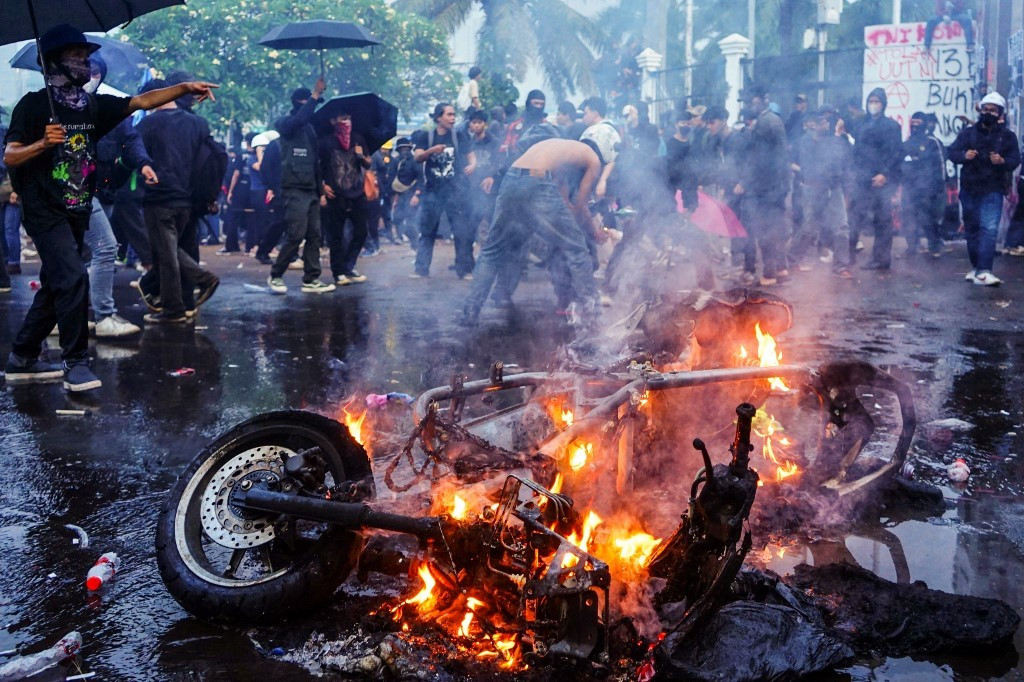News
Prabowo uses big stick, few carrots to restore order
Tenggara Strategics September 8, 2025 Protesters set fire to a police motorcycle during a demonstration against a revision to the armed forces law in front of the House of Representatives building in Jakarta on March 27, 2025. The Indonesian parliament approved the amendment of the military law on March 20, despite protests that it would expand the armed forces' role in civilian affairs. The revision to the armed forces law, pushed mainly by President Prabowo Subianto's coalition, was aimed at expanding the military's role beyond defense in a country long influenced by its powerful armed forces. (AFP/Azwar Ipank)
Protesters set fire to a police motorcycle during a demonstration against a revision to the armed forces law in front of the House of Representatives building in Jakarta on March 27, 2025. The Indonesian parliament approved the amendment of the military law on March 20, despite protests that it would expand the armed forces' role in civilian affairs. The revision to the armed forces law, pushed mainly by President Prabowo Subianto's coalition, was aimed at expanding the military's role beyond defense in a country long influenced by its powerful armed forces. (AFP/Azwar Ipank)
The deployment of the Indonesian Military (TNI) to crack down on massive nationwide protests, some of which descended into violence, around the turn of the month may have helped restore order. President Prabowo Subianto, for one, felt comfortable enough about the situation in the country for him to make a quick trip to Beijing.
Prabowo also offered political concessions to protesters and mobilized leaders of political parties and religious and labor groups to help contain the public outrage at the current political and economic conditions.
The President may be using many carrots, but the one big stick, the use of the military, is the single biggest factor that is preventing university students from taking to the streets in big cities, which they had planned for five days starting Sept. 1. Some student groups have not given up on the idea and are rethinking their strategy in the face of the TNI deployment. Could this be a case of an eerie calm before the storm? We will know soon enough.
Prabowo, a former Army general, gave the greenlight to the military to intervene and help police contain what he described as acts of anarchy, into which many of the protests had transformed. In a later speech, he said some of the actions bordered on treason and terrorism, although he did not elaborate or provide evidence.
The message is clear: He has given the TNI carte blanche to do whatever is necessary to stop the violence.
Police failed in their job as they had themselves become targets of violence after one of their tactical vehicles ran over a protester, a motorcycle taxi driver. That brutal incident on Aug. 28 was live-streamed raw and unedited on social media platforms, and the videos quickly went viral, creating even more outrage at police brutality.
Protesters targeted police headquarters and smaller stations, and the House of Representatives building in Jakarta. Several regional legislative council buildings were set on fire. Public facilities such as bus stops in Jakarta were damaged. Three politicians and Finance Minister Sri Mulyani Indrawati also saw their houses looted by mobs.
There have been at least four more deaths among protesters and others since then, and dozens, including police officers, were injured in clashes.
Many religious and labor leaders, following their meeting with President Prabowo, have appealed for calm and for protesters to show restraint. Five members of the House were suspended by their political parties, and the House has announced it has canceled the new monthly housing allowance that had originally triggered the protests.
Although President Prabowo promised to respect freedom of expression, his instruction to the security forces to do whatever is necessary is interpreted differently on the ground. We can expect more repressive measures in response to the protests. The military is trained to kill the enemy, not to deal with civilian protests.
Dozens of students and activists have been arrested, and security forces have stopped out-of-town students from coming to Jakarta. In Bandung, security forces stormed a university campus where students reportedly gathered to plan their next move.
The deployment of the military may have restored peace and order for now, but it is not an effective recipe to regain public trust in the government, which is in huge deficit.
It does not address the many grievances that underpin the massive protests. The report of House members giving themselves generous housing allowances and the police brutality in handling protesters were just triggers of the mounting pent-up public anger at their economic conditions and gradual loss of freedom.
Signs of widespread discontent were clear with the raising of the One Piece anime flag during the independence anniversary last month, and the popular meme “Dark Indonesia” that went viral on social media earlier this year.
Prabowo’s emphasis on a security approach is not surprising, given his military background, and is consistent with the perception of a creeping militarization in the government.
He has expanded the size of the military with the creation of new regional commands and 100 new Army battalions. More military officers are now taking up civilian positions following legislation that expands the number of government jobs open to serving TNI personnel.
Rumors that President Prabowo may declare a state of emergency persist after his claim of possible treason and terrorism. The consequence of such a move, however, would be detrimental not only to democracy and people’s freedom but also to the economy.
What we've heard
Prabowo held a meeting at his residence in Hambalang, Bogor, to address the escalating demonstrations. According to several sources within Prabowo’s inner circle, the Gerindra Party chairman was torn after being presented with several findings related to the protests. One of the findings, the source said, was an indication of military involvement.

